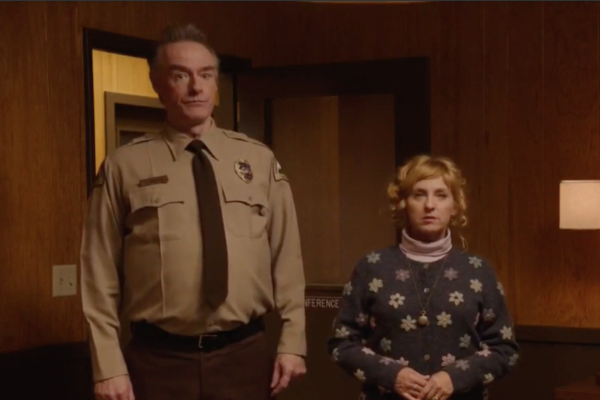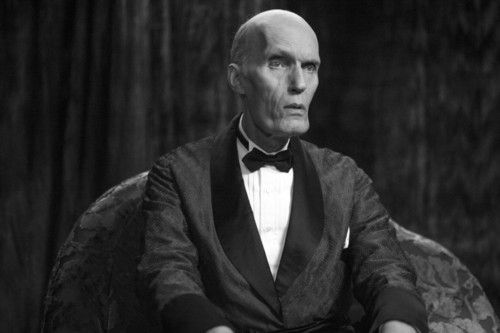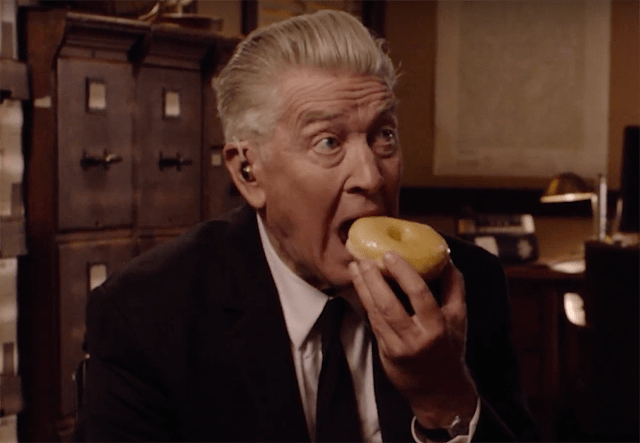David Lynch is specifically attempting to pioneer a new visual storytelling medium with Twin Peaks season three. You can stop searching for hidden "meanings" right here and now. The headline purpose is writ very large.
Readers familiar with David Lynch's most recent cinematic endurance piece (and I say that fondly) Inland Empire, may already have some sense where this post is going.
Rabbits appear as one of the more central, albeit mystifying of Inland Empire's motifs. The film cuts periodically to a 'sitcom' which features three humans with giant rabbit heads, always filmed in one dingy living room. It is always raining outside.
Inland Empire is either all about the bunnies or not about the bunnies. They may be a total red herring, but if they are, they're the most absurd and over-invested one in cinematic history.
The footage is cribbed from a complete online miniseries Lynch created called "Rabbits". It appears to be a parody of the sitcom form. The episodes all feature a randomly inserted laughter track that appears not to be aligned at all to the dialogue, which contains no punchlines. The characters mostly intone sentences that appear to be part of a narrative, but are all delivered out of sequence, it's all quite disturbing and ultimately quite tedious.
And disturbing and tedious are two places Lynch has been decidedly unashamed to dwell during the first seven episodes of Twin Peaks' return. Nostalgia's a location we've only happened across briefly. This is in absolutely no way whatsoever a re-hash of or hat-tip to the first two seasons.
Crucial I think to the cinematic ontology that Lynch is (re-)creating in Season Three is the scene with Hawk and Lucy attempting to determine "what is missing". The deterministic uncertainty around the term seems crucial to the entire project.
"Everything is here therefore nothing is missing" can be simultaneously true with "object x is not here, therefore something is missing", leading Hawk and Lucy/Andy to different conclusions about the possibility of anything being "missing." The confusion arises not over the status of the object, it derives from the definitional uncertainty of what "missing" means.
And the viewer seeking a vehicle via which to engage their nostalgia will find themselves similarly confused, untethered to enough simple truths or histories or narratives to complete that ontological transaction either.
And that's precisely where David Lynch wants you.
What is Missing?
Are the Rabbits in Inland Empire present or missing from the text, are the characters themselves present in any, none or even multiple texts? Where is their "reality" located? None of these questions are answered.
Is Cooper present in the real world twice, once or not at all? And is he still present in the red room? How has he been tricked? What happened when he was sent to 'non-existence'? Who was the companion woman? Where is "real" Cooper, the hero of the first two seasons? We are yet to see him in that identity.
We've been forced to watch so far seven hours of absolutely pained simulacra from Kyle Maclachlan. The Coop we remember hasn't yet spoken a word. Seven out of eighteen episodes in already. The star has been Naomi Watts (and how, Naomi ... you will win an oscar ... and my proposal still stands). What is missing?
The status of the chocolate bunny is definitely 'missing'. It's been eaten. But is it significant or is it a red herring? Hawk's moment of real uncertainty reflects our own. In fact he about sums up the viewer's entire experience of Inland Empire. "Is it about the bunny?" And he pauses on the actual cusp of attaining meaning, and we viewers pre-emptively reach for it, but ... "No. It's NOT about the bunny."
What is seems to be about has to date been a surprisingly uncomplicated resolution to the ends Lynch left us hanging with. Good Dale has been in the black lodge 25 years, while Bob has wreaked earthly havoc in his body as bad guy Dougie Jones.
But it appears Bob has laid a trap, and somehow created a second Dougie Jones who was living a mild mannered family existence. Instead of returning to his own body, Coop has been sent back into the body of the other Dougie Jones, and thus Bob has not been returned to the black lodge.
Both Bob and Coop have spewed out their creamed corn garmbanbozia and consequently both appear to have manifestly lost their identities and are operating as automata. Phillip Gerard appears to be trying to trying to help Cooper from the black lodge, and informs him one of them now must die.
The arm, as in past seasons appears to be affiliated with the Bob spirit (when we were informed Gerard severed his own arm to stop Bob's murderous bent). The other spirits, the giant and the Laura Palmer figure appear to be on Coop's side. The "evolved" arm is depicted with a "gash" in it that evokes images of the eviscerated corpses to which we've so far been treated.
Somehow the abortive transmission of Cooer between worlds is linked to his being 'trapped' within the glass box, but it's unleashed a murderous force simultaneously, almost certainly linked to Bob. But why was sexual energy seemingly so central to catalysing the exchange?
And where is Twin Peaks? It's already abundantly clear that Lynch has very little interest in this as a nostalgia vehicle. Ben and Jerry Horne are now a completely literal parody of the Zionism-loving ice cream doyens, but the reality is very little in the first four episodes relies on the previous two seasons even for backstory.
And it's going to disappoint a lot of people in this respect. But we need to be aware that Lynch has very demonstrably moved on from the themes that were his obsession twenty five years ago. Small-town, cherry pie loving America was mythologised and pulled apart by Twin Peaks as much as it was in Blue Velvet.
But this project belongs with Inland Empire, a project at the OTHER end of Lynch's career. Season Three is all about big cities and POSTmodern discourses and how they fragment and ultimately deny any possibility of a finite, concrete self, reality or identity.
What is "Missing"?
What we, the viewer are missing is any semblance of a conventional television narrative.Lynch is the absolute master of the uncanny. Uncanny meaning recognisable enough to identify ourselves within, but never 100% safely. Something's always, as Gordon Cole sums up, "very wrong". To me the most interesting aspects off the return of Twin Peaks all relate to what they tell us about the Director himself, and the "wrongness" of serving something up in this form as mass-market television.
Remembering this is a man who in recent years has expressed not much more than apathy at the prospect of ever making another film, a man who has probably done more than anyone to blur the distinction between cinematic auteur and more traditional notions of "the artist", whose output in the visual arts and music arenas represents genuine engagement with their proper form and tradition such that he's never remotely an amateur or hobbyist, the guy who it's long struck me must surely be astounded that nobody's noticed he's made the same film three times in a row now, the guy who said he wasn't going to make another film until he came up with a new enough idea, the guy who is credited with creating the space occupied by every critically successful TV series to debut in the last 25 years, the guy who has been convinced to come BACK to all this, who actually walked away from the project because he wasn't offered the screen time he needed to do it properly, the guy whose cinema has basically become depicting the postmodern, fragmented, discursively-determined self-identity.
If that guy says he needs 18 hours to tell a story, and puts his foot down for the right to tell it, and when he's the sort of guy who basically doesn't get dragged back to something like this without it having some kind of headline purpose, the bloke whose last movie was there almost ridiculously slow hours in length, and he, the cinema purist shot it on VIDEO and said he may not go back to film ...
When all those things happen in advance, and when what is served up , even in that context is as perplexing, odd and as disconnected to TV or cinema traditions as to seem to be self-sacrificing, then, well, what I'm building up to is ...
This may well be the crowning moving picture career move by arguably the most important figure in the field. And he isn't trying to change either television or cinema. He's looking to invent a NEW FORM with characteristics of both.
He's said it in interviews this is more like an 18 hour movie than a TV series. This is the pilot episode of a series that a TV executive would be so confounded by they'd reject instinctively. Why can that Netflix guy run around likening this show to heroin and think that's a marketing play to middle America? Because today all he needs is your SUBSCRIPTION. He doesn't care - much - if you never watch a minute.
Think about that. Think about how different an operating environment we are now in. Think like that because I'm pretty sure that's how David lynch this is about it. Think about it because you really ought to be paying attention when modern TV and cinema's great innovators invests two seasons worth of production, writing, directing, sound editing -
DAVID LYNCH IS ATTEMPTING TO PIONEER AN ENTIRE NEW VISUAL MEDIUM. TWIN PEAKS SEASON THREE IS VERY LITTLE MORE THAN HIS ATTEMPT TO ACHIEVE THIS.
And now you know how to read it all. And Lynch has peppered his text with little confirmations.
I was watching a vlog recently from a couple of characters discussing the scene with Michael Cera's character. Their take was that it was incredibly humorous. So, sorry Mr Lynch, but in spite of how obvious you've made it, your goals are being thwarted by the medium you've chosen.
The scene ISN'T humorous. It's weird, it's affectatious, it's PAINFUL to watch, it's BORING, it's self-consciously ham-fisted. The Michael Cera character isn't remotely believable. It shouldn't be able to even exist as television. Why have two of the least erudite characters in the show spawned a Shakespearean Brando? It makes as little narrative sense as it does logical.
The same goes for having your lead character not speak a single word for the first seven hours, when you're expected to do nothing more than rote re-fire the same neurons in your audience from twenty five years ago and collect your cheque.
The same goes for the DEEPLY WEIRD game Lynch seems to be playing of turning Gordon Cole into a semi-disturbing office perve. It's actually a trope that's never been put on screen before. And because it's a character that he himself is playing, and because Michael Anderson (the dwarf from the first two seasons) isn't in this because he went to the media and said Twin Peaks was the story of Lynch's relationship with his own daughter ... Lynch seems to be trying to find a million subtle ways to completely, but quietly, and from within, eat the heart out of conventional TV narratives once and for all.
So pay attention to all the boring, and the tedious, and the affectatious and the downright odd. Through those dimensions a revolution is being wrought. It was ALWAYS about the bunny.







